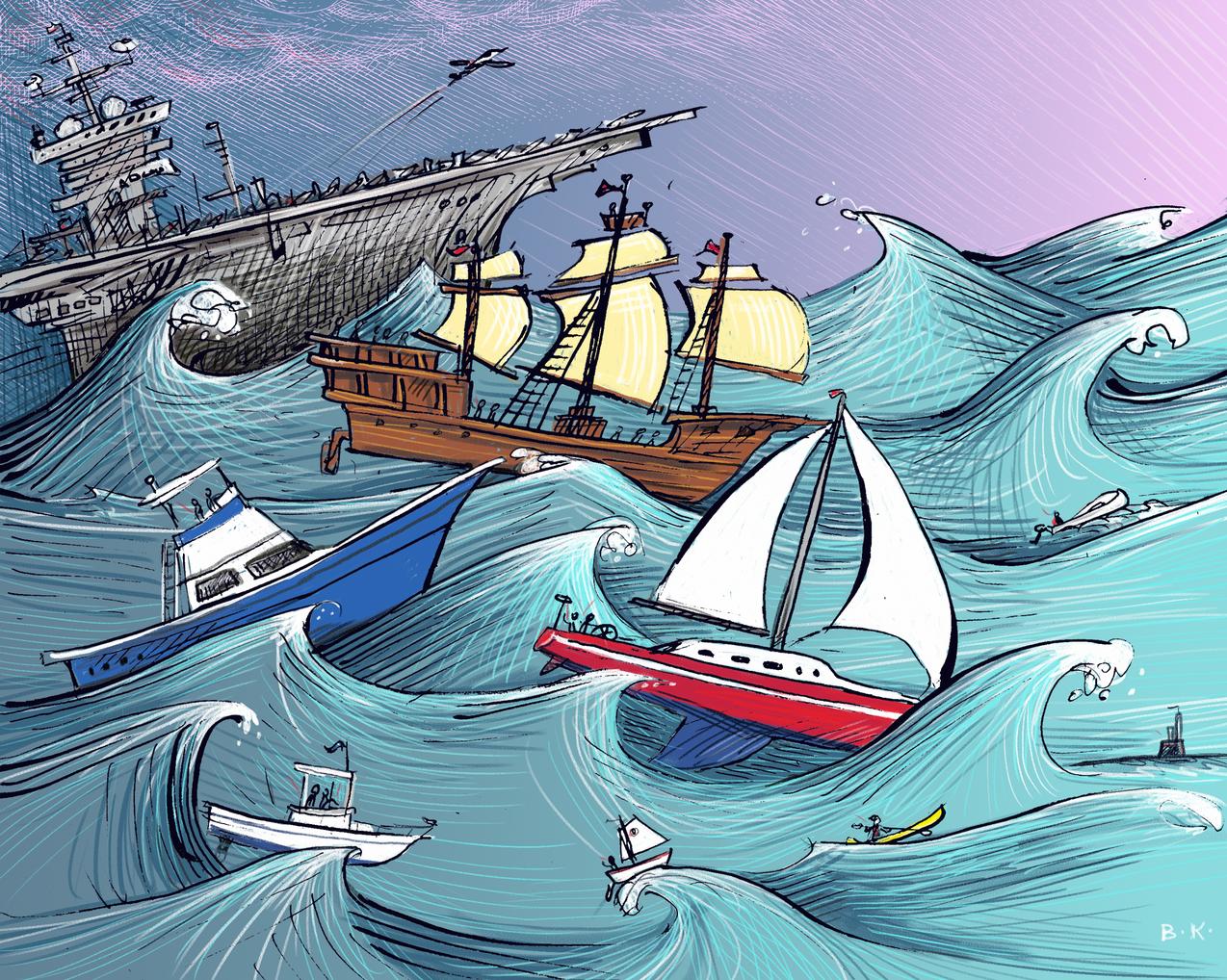Dipping toes in trauma informed ways of being

The trauma around and within us right now
If we want to be trauma informed, let’s start by being informed by the trauma all around us and within us right now.
We’ve all been in the same storm but on different boats. We have shared a collective trauma but we have experienced it individually. So, no surprise then that there is not a one-size-fits-all formula for how to support each other in this almost post, but still lingering pandemic. It’s so tempting to be reductionist about it, jazzing up wellbeing offers and rhetoric at work, meanwhile diaries fill up with ‘hybrid’ models of working to soothe our post-traumatic longing for connection.
We have to start somewhere, right? But we must remember those boats – some of us are in pedal boats and the pace of this is frightening and others in yachts and it’s all too slow and too much fuss.
Fight, flight, freeze
So, how to do this with and for each other whilst our nervous systems are still searching for calming cues that are thin on the ground (masks, distance, kids home from school, daily figures etc)? I have become aware that I am still alternating between freeze and flight/fight and spend more time telling myself stories from these places than I do from a regulated, calm place. I have thought to myself, is it healthy to be let loose on the world from this position, should I be muddling through, masking it up…but what’s the alternative? That’s not to compare my recent experiences with people who have suffered hugely traumatic experiences, such as abuse, but for some this muddling through, or indeed much worse, could be a daily reality.
This, I think, is a sobering moment for us working in any kind of service that hopes to make a difference to people going through tough times. Look how hard it is for us to navigate the almost-post-but-not-quite pandemic. How the uncertainty in our environments breeds uncertainty in our brains and therefore actions and reactions to our worlds. How vigilant we are to cues of danger, particularly for strong emotions that are tangibly close to the surface in our meetings, agendas and communications. And how challenging it is to stay authentic, connected and reach out to each other when these are our internal conditions.
Yet isn’t what we expect of people when we offer them our service? Or of colleagues when we work with them?
How aware are we of people’s internal worlds and our contribution to the cues in their environment when we ask them to step into our rooms, our sessions, our frameworks, our assessments and conversations led by us with our agendas?
The opportunity
Looking at it another way though, it is an exciting moment of opportunity. Our collective experience of being affected, albeit in different ways, by the enforced withdrawal of soothers to our regulated, calm selves, i.e. loss, disruption and rapid changes to our connections and sense of purpose mean we can no longer unsee it: these are the elements at the heart of anything that means anything to anyone. And so should now be front and centre and not at the back or to the left of our ways of being and integral to all public service organisations mission, vision and purpose.
Easier said than done, yes I know. I know this is difficult because at Platfform we are on a journey to be more trauma informed and yet recently as our emotions have bobbed to the surface, reacting to our stories coming from fight/flight/freeze, we are finding that holding safe spaces is more challenging than it sounds on a lovely slide.
But we’re trying. I’m trying. Trying to work this churney, uncomfortable stuff out, whilst letting the feels come and still get on with the job. Trying to not be a dick in the process, I haven’t always succeeded there, and therefore am really testing the ‘safe to fail’ culture that working like this entails. I also have the ‘never failure only learning’ slide in my deck and what I am learning right now is that this is not a quick or obvious process. But that’s the point, controversial for me: suddenly I am a fan of process.
I have always bemoaned processes as taking the human out of human services. This is true where it leads to tick box, reductionist delivery but it is not true when it comes to witnessing and helping people navigate these seas. It is a PROCESS and not an event.
There is no bish, bash, bosh about being trauma informed. There are moments of sitting with extreme discomfort, letting it be there and taking the time to process it.
We’re trying at Platfform because we want to practice what we preach and I am heartened by how humbling this is. These are human experiences, to be felt for a reason, we can notice and heed them and be brave as we face them and share them with others. If we can find a way to calm the seas for our different boats, to listen to each others stories and from which parts from within us they are being told, if we can take a breath and not ‘do’ our way out of this but ‘be’ our way though it and be patient, then we will be coming from a place of humility, curiosity and compassion as we think about our work and how to do it. No training course that I’ve ever been on could teach this, we’ve had to feel it and maybe from this place maybe we can turn the tides.
NB: Illustration by Barbara Kelley.

